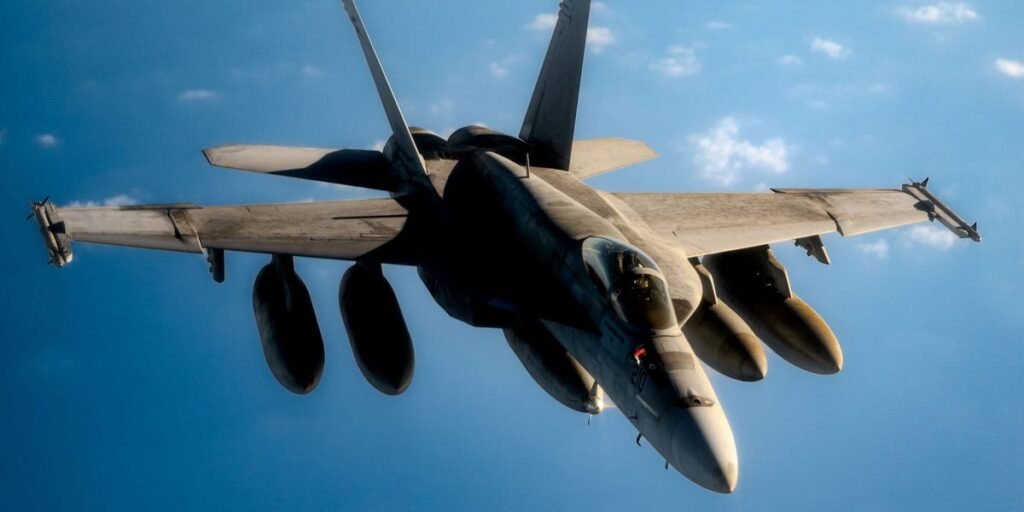The Trump administration’s airstrikes against the Houthi rebels in Yemen — discussed by top officials in the unclassified Signal chat group — are a dramatic escalation of the US’s confrontation with the group for its attacks on commercial ships and naval vessels, regional experts told Business Insider.
“The Trump-era strikes are broader in scale and formed as part of a sustained campaign targeting not only Houthi infrastructure — such as hideouts, stockpiles, and military assets — but also the group’s leadership,” Freddy Khoueiry, a global security analyst for the Middle East and North Africa at the risk intelligence company RANE, told Business Insider.
“This mirrors Israel’s approach during its conflict with Hezbollah, where efforts to degrade military capabilities were accompanied by systematic strikes on field commanders, eventually reaching senior leadership figures and the upper echelon.”
This focus bears out from the Atlantic’s bombshell reporting on the Signal group: “The first target – their top missile guy – we had a positive ID of him walking into his girlfriend’s building and it’s now collapsed,” National Security Adviser Michael Waltz texted. “Excellent,” Vice President JD Vance replied.
Regional experts cautioned it is likely to take months to see whether more airstrikes and targeting the Houthi movement’s leaders will end its attacks on Israel and merchant ships. The Houthis may also end these attacks with a new Gaza ceasefire or an Israeli return to the existing one.
The Houthis began a campaign targeting and hijacking commercial ships transiting the Red Sea shortly after the October 2023 Gaza war began; Hamas, like the Houthis, are armed and trained by Iran. The Yemeni militants also launched intermittent drone and missile strikes against Israel.
The Biden administration responded by dispatching the US Navy to protect commercial shipping near the Bab al-Mandab strait and repeatedly struck military targets in Yemen like missile launchers, underground storage facilities, radars, and air defenses. These efforts failed to end the attacks. The State Department redesignated the Houthis a foreign terrorist group in March.
The Houthis halted attacks targeting Israel and commercial shipping following the January ceasefire in Gaza. On March 12, the group announced they would resume attacks if Israel did not stop blocking aid to the coastal Palestinian enclave. Three days later, the Trump administration ordered the intensified campaign.
In the private group chat on Signal that, in an extraordinary turn, accidentally included the editor-in-chief of The Atlantic, Secretary of Defense Pete Hegseth pressed for the strikes over Vance’s qualms, in part by arguing that only a tougher air campaign would deter the Iran-backed rebel group.
“I see it as two things: 1) Restoring Freedom of Navigation, a core national interest; and 2) Reestablishing deterrence, which Biden cratered,” Hegseth texted
In an interview with ABC’s “This Week” show, Hegseth contrasted Biden’s “pinprick, back-and-forth — what ultimately proved to be feckless attacks” with Trump’s “overwhelming response that actually targeted multiple Houthi leaders and took them out.”
The US is only the latest force to confront the Houthis. Saudi Arabia led a multinational coalition against the Houthis in a war that began in 2014 after the Houthis captured Yemen’s capital, Sanaa, from the internationally recognized government and ended with a ceasefire in 2022 that’s still in place.
The new US campaign bears similarities to the Israeli approach. After the Houthis successfully hit Tel Aviv in a drone attack last July, Israel also launched several long-range airstrikes against the group and threatened to hunt down its leadership. Since beginning its current campaign on March 15, the US has asked Israel not to respond to the latest Houthi missile attacks, which Israeli air defenses successfully intercepted, by stating: “Leave it to us.”
SA Daniel Kimmelman/US Navy
Compared to Hezbollah in Lebanon, Israel has relatively little intelligence on the more distant Houthis, a deficiency it has recently sought to rectify. This is in stark contrast with how deeply it infiltrated Hezbollah. In addition to injuring over 3,000 Hezbollah members with booby-trapped pagers and walkie-talkies in September, Israel also assassinated the group’s long-time leader, Hassan Nasrallah.
Israel’s strikes sought to inflict economic damage on the Houthis through strikes on energy facilities and ports controlled by the group.
“The Biden administration largely adopted a defensive posture, engaging in reactive, tit-for-tat operations,” Mohammed Al-Basha of the Basha Report, a Virginia-based Risk Advisory, told BI. “The Trump administration, however, is not pursuing regime change or aiming to topple the Houthis. It has deliberately avoided targeting infrastructure that would harm the civilian population.”
“It is an offensive posture designed to reestablish deterrence,” Al-Basha said. “President Trump has made it clear that continued Houthi attacks on US naval vessels in the Arabian and Red Seas will no longer be tolerated.”
“While it is still too early to fully assess the campaign’s effectiveness, even the Houthis have acknowledged that they are suffering losses and casualties from the ongoing airstrikes.”
The airstrike campaign faces similar problems to those that came before.
The Houthis are “deeply entrenched in Yemen’s challenging terrain” and may have prepared for a protracted campaign, said RANE’s Khoueiry, who thinks only a long-term air campaign could deter the Houthis.
Independent Middle East analyst Kyle Orton believes it’s “too early to tell” if Trump’s overall approach will ultimately yield any more than the Biden administration achieved.
“The strikes in themselves have done little to damage the Houthis, and it remains to be seen if this was, as some administration rhetoric has suggested, the opening volley in a sustained campaign,” Orton told BI.
A significant shift in US policy towards Yemen, in Orton’s view, would entail a sustained air campaign that coordinated action with Arab allies and the recognized Yemeni government to recapture territory held by the Houthis.
“There is, however, little indication Trump is willing to get ‘entangled’ in the Middle East so seriously,” Orton said.
Paul Iddon is a freelance journalist and columnist who writes about Middle East developments, military affairs, politics, and history. His articles have appeared in a variety of publications focused on the region.
